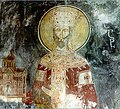Portal:Abkhazia
The Abkhazia Portal
 |
 |

| |
Abkhazia (/æbˈkɑːziə/ ab-KAH-zee-ə), officially the Republic of Abkhazia, is a partially recognised state in the South Caucasus, on the eastern coast of the Black Sea, at the intersection of Eastern Europe and Western Asia. It covers 8,665 square kilometres (3,346 sq mi) and has a population of around 245,000. Its capital and largest city is Sukhumi.
The political status of Abkhazia is a central issue of the Abkhaz–Georgian conflict and Georgia–Russia relations. Abkhazia has been recognised as an independent state by Russia, Venezuela, Nicaragua, Nauru, and Syria; however, the Georgian government and nearly all United Nations member states consider Abkhazia sovereign territory of Georgia. Lacking effective control over the Abkhazian territory, Georgia maintains an Abkhaz government-in-exile.
The region had autonomy within Soviet Georgia at the time when the Soviet Union began to disintegrate in the late 1980s. Simmering ethnic tensions between the Abkhaz—the region's titular ethnicity—and Georgians—the largest single ethnic group at that time—culminated in the 1992–1993 War in Abkhazia, which resulted in Georgia's loss of control over most of Abkhazia and the ethnic cleansing of Georgians from Abkhazia. Despite a 1994 ceasefire agreement and years of negotiations, the dispute remains unresolved. The long-term presence of a United Nations Observer Mission and a Russian-led Commonwealth of Independent States peacekeeping force failed to prevent the flare-up of violence on several occasions. In August 2008, Abkhaz and Russian forces fought a war against Georgian forces, which led to the formal recognition of Abkhazia by Russia, the annulment of the 1994 ceasefire agreement and the termination of the UN mission. On 23 October 2008, the Parliament of Georgia declared Abkhazia a Russian-occupied territory, a position shared by most United Nations member states.
Refresh
Selected article -
The Abkhazian Revolution took place in 2014, when President Aleksandr Ankvab resigned after hundreds of demonstrators stormed his office. After mass protests in the capital Sukhumi and the occupation of his office on 27 May, Ankvab fled to his hometown of Gudauta and ultimately resigned on 1 June, after previously denouncing the demonstration as an attempted coup d'état.
The uprising was attributed to public anger with Ankvab over his perceived liberal policy toward ethnic Georgians in Abkhazia, a breakaway republic with limited recognition. Although Abkhazia seceded from Georgia in 1992, the Ankvab administration allowed ethnic Georgians to register as voters and receive Abkhazian passports. (Full article...)Selected image
Selected biography -

List of selected biographies
|
|---|
General images
Did you know?
- ...that the Voronya Cave in the Arabika Massif is currently the world's deepest cave and that its complete depth has not yet been established?
- ...that Lavrentiy Beria, the feared head of the Soviet NKVD, was born in the village of Merkheuli and that he went to school in Sukhumi?
- ...that during the Orange Revolution in the Ukraine, Abkhazia witnessed a very similar political crisis following the 2004 presidential election, which lasted twice as long?
- ...that there is a tiny community of Afro-Abkhazians, descendent from slaves bought centuries ago from the Turks?
Related portals
Things to do
WikiProjects

- WikiProject Abkhazia – a project to improve all articles related to Abkhazia.
- WikiProject Limited recognition – a project that seeks to improve coverage of entities with limited international recognition.
Associated Wikimedia
The following Wikimedia Foundation sister projects provide more on this subject:
-
Commons
Free media repository -
Wikibooks
Free textbooks and manuals -
Wikidata
Free knowledge base -
Wikinews
Free-content news -
Wikiquote
Collection of quotations -
Wikisource
Free-content library -
Wikiversity
Free learning tools -
Wikivoyage
Free travel guide -
Wiktionary
Dictionary and thesaurus
External media
Portals






![Image 5Enguri Bridge [ru] over the Enguri river (from Abkhazia–Georgia border)](http://upload.wikimedia.org/wikipedia/commons/thumb/9/9d/Enguri_River_Bridge_2018013.jpg/120px-Enguri_River_Bridge_2018013.jpg)







![Image 13Enguri Bridge [ru] over the Enguri river border (from Abkhazia–Georgia border)](http://upload.wikimedia.org/wikipedia/commons/thumb/4/48/Russian_military_post_at_the_administrative_boundary_line_of_Abkhazia%2C_2016.jpg/120px-Russian_military_post_at_the_administrative_boundary_line_of_Abkhazia%2C_2016.jpg)










